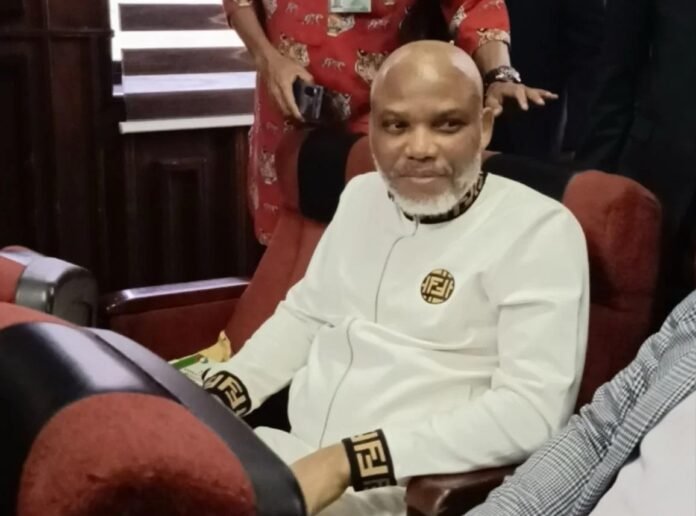Detained leader of the Indigenous People of Biafra (IPOB), Mazi Nnamdi Kanu, has again taken the Federal Government to court, seeking to halt his ongoing trial permanently.
In the new suit before the Federal High Court in Abuja, marked FHC/ABJ/CR/383/2015, Kanu insisted that his prosecution offends the rule of law, describing it as “a flagrant abuse of judicial process.”
He anchored his argument on four fatal defects: contempt of appellate authority, denial of fair hearing, reliance on a forged medical report, and failure to take judicial notice of repeal.
“These four defects strike at the root of jurisdiction,” his legal team argued. “Each is independently fatal; together, they render the entire trial incompetent and void.”
According to Kanu, the Court of Appeal had already discharged him in an earlier judgment — a decision that remains binding until set aside.
He cited previous rulings such as Governor of Lagos State v. Ojukwu (1986) and Rossek v. ACB Ltd (1993) to support his claim that the government’s refusal to obey the appellate order makes its continued prosecution contemptuous.
“By the doctrine of appellate finality, that order ended the trial absolutely,” Kanu stated.
He added that the Federal Government, being in disobedience of a higher court’s order, cannot seek relief from a lower one. “A contemnor cannot invoke the equitable discretion of a court while in defiance of its authority,” he said.
‘Four Years in Solitary Confinement’
Kanu further accused the government of denying him fair hearing. He told the court that after spending four years in solitary confinement, he was only allowed three hours of monitored access to his lawyers on the eve of entering his defence in a capital case.
“That is not fair hearing — it is judicial perversity,” he declared.
The IPOB leader also claimed that the court relied on a forged medical report to rule that he was fit for trial. He said the document, dated September 23, 2025, predated the court’s own directive to the Nigerian Medical Association to carry out a medical examination on September 26.
“No such examination ever took place,” Kanu maintained, calling the ruling “vitiated by fraud.”
Citing the classic case of Madukolu v. Nkemdilim (1962), Kanu’s motion argued that once any condition precedent to jurisdiction is absent, “the entire proceedings become a nullity.”
He therefore urged the court to terminate the trial immediately, in the interest of justice and the rule of law.
Rate, Like 👍, Comment 💬, Share this article, Follow us on our social media handles, and Submit your own story to get featured and earn rewards!







